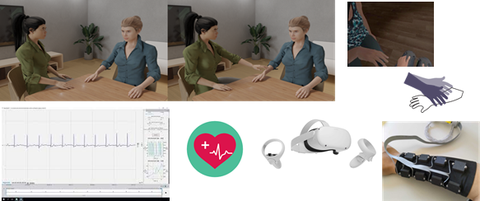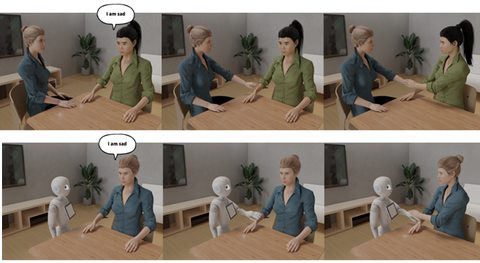Theses
Open Bachelor / Master / State Exam Theses
We investigate potential sham tDCS-induced changes in neural resting state activity in young and old adults.
Details
Type: M.Sc.
Data type: empirical (existing data)
Start: 2025-03 or later
Supervisor und contact: Evelyn Muschter, Dr. Kathleen Kang
We want to investigate changes in neural oscillations during the training phase of word learning using existing data of 8 experiments. Preliminary analysis scripts are available.
Our data includes:
a) temporal synchrony of presented stimuli (simultaneous vs sequential) and modality of objects (auditory vs visual) from 4 studies
b) musicians
c) athletes
d) reverse order
Details
Type: M.Sc.
Data type: empirical (existing data)
Start: 2024-09 or later
Supervisor and contact: Samuel H. Cosper (PI), Evelyn Muschter
In this project we aim to investigate the development of neural oscillatory activity from existing resting state EEG data (appropriate open-source data to be determined) across the lifespan. Some knowledge about EEG and experience with EEG analysis would be beneficial. Students should be familiar with Matlab (Fieldtrip), EEGLAB or other programming languages.
Details
Type: M.Sc.
Data type: empirical (existing data)
Start: 2024-09 or later
Supervisor and contact: Evelyn Muschter, Samuel H. Cosper, Dr. Kathleen Kang
We want to investigate the affective properties of stroking-like actuations generated by a newly developed arm-sleeve. You will measure and analyze facial electromyography (EMG) data of a sample of older adults. Basic statistical knowledge is helpful, while skills in EMG data acquisition can be learned quickly.
Details
Type: B.Sc.
Data type: empirical (to be collected)
Start: 2024-09
Supervisor and contact: Brais Gonzalez Sousa
The project investigates the role of in-group/out-group dynamics in shaping the perception and interpretation of affective touch. Using the online experimental platform Gorilla.sc, students will design and implement a new empirical study investigating cultural differences in the way we perceive vicarious touch (comparing different types of touch, body areas and cultural characteristics of the toucher-touchee). Subjective ratings (pleasantness, emotional meaning) will be collected.
Details
Type: M.Sc.
Data type: empirical (to be collected)
Start: 2025-03
Ideal student’s background: psychology
Supervisor and contact: Dr. Irene Valori,
Responsible Professor: J. Prof. Merle Fairhurst
The project investigates the role of in-group/out-group dynamics in shaping the way people use affective touch. Using the online experimental platform Gorilla.sc, students will design and implement a new empirical study investigating cultural differences in the way individuals touch others in different situations (to express different emotional meanings, on different body areas, depending on the touchee’s demographic characteristics). Participants will imagine touching others in different contexts and simulate touching them by interacting with a touch-screen. Touch behaviour (e.g., kinematics of touch-screen stroking) will be measured.
Details
Type: B.Sc.
Data type: empirical (to be collected)
Start: 2025-03
Ideal student’s background: psychology
Supervisor and contact: Dr. Irene Valori,
Responsible Professor: J. Prof. Merle Fairhurst
The project investigates the potential (and limitations) of tactile actuators to create digital versions of affective touch. Participants are administered real (skin-to-skin) or digital (vibrotactile) tactile stimulation with optimal or sub-optimal characteristics for the activation of C-Tactile afferents that encode affective characteristics of touch. Subjective measures (ratings on pleasantness, realism and emotional content) and physiological measures (heart rate and skin conductance) are used to distinguish the effects of these two types of touch.
Details
Type: M.Sc.
Data type: empirical (to be collected)
Start: 2025-03
Ideal student’s background: psychology, neuroscience, data science
Supervisor and contact: Dr. Irene Valori,
Responsible Professor: J. Prof. Merle Fairhurst
The project investigates how people perceive interpersonal, social touch in Virtual Reality. The candidate for this student project can proficiently use Blender and Unity to create 360° scenarios and animations of avatars performing dynamic interpersonal tactile gestures (e.g. a gentle caress on the touchee’s arm). The student will also conduct lab-based experiments to test the scenarios with participants.
Details
Type: M.Sc.
Data type: empirical (to be collected)
Start: 2025-03
Ideal student’s background: computer science, miscellaneous (skills with Unity, Blender, game development are required)
Supervisor and contact: Dr. Irene Valori,
Responsible Professor: J. Prof. Merle Fairhurst
The project investigates the role of in-group/out-group (e.g. cultural and gender) dynamics in shaping the perception and interpretation of affective touch. Participants are exposed to immersive virtual reality scenarios where they receive touch from an avatar from either an in-group or out-group. Subjective ratings (pleasantness, realism and emotional content), physiological responses (heart rate and skin conductance), and neural activity (fNIRS) are measured.
Details
Type: M.Sc.
Data type: empirical (to be collected)
Start: 2025-03
Ideal student’s background: psychology, neuroscience, data science
Supervisor and contact: Dr. Irene Valori,
Responsible Professor: J. Prof. Merle Fairhurst
Theses in progress
| thesis type | title |
|---|---|
| LA (StEx) | Der Einfluss schulischer Umgebung und evidenzbasierter Fördermaßnahmen auf die schulische Entwicklung von Kindern mit psychischen Verhaltensauffälligkeiten |
| LA (StEx) |
Die Auswirkungen digitaler Ressourcen im Unterricht auf Lernende mit Aufmerksamkeitsdefizit-Hyperaktivitätsstörung |
| M.Sc. |
Changes in neural oscillations during word learning |
| LA (StEx) | Die Auswirkung von Medienkonsum auf die subjektive Stressempfindung in der späten Adoleszenz |
| B.Sc. | Dyadic interventions for older adults with mild cognitive impairment or dementia |
| B.Sc. | Polizeiliche Interaktionen mit psychisch kranken Menschen: Ein systematisches Review europäischer Studien zu Herausforderungen und der Rolle von Mental Health Literacy |
| B.Sc. | Episodic Future Thinking in Mild Cognitive Impairment and Dementia |
| B.Sc. | Is Episodic Future Thinking affected by lesions in the MTL? A systematic review |
| B.Sc. | Is Episodic Future Thinking affected by aging? A systematic review |
| B.Sc. | A systematic review on the relationship between delay discounting and procrastination |
| B.Sc. | Utility of pareidolia assessment in neurocognitive conditions: a systematic review |
| B.Sc. | Sensorimotor integration in typically developing children and adolescents |
Further theses options
If you are interessted in writing a Bachelor thesis, Master thesis or State Exam thesis (educational sciences) about a different topic in the area of lifespan developmental neuroscience, please contact Prof. Shu-Chen Li, Ph.D.


